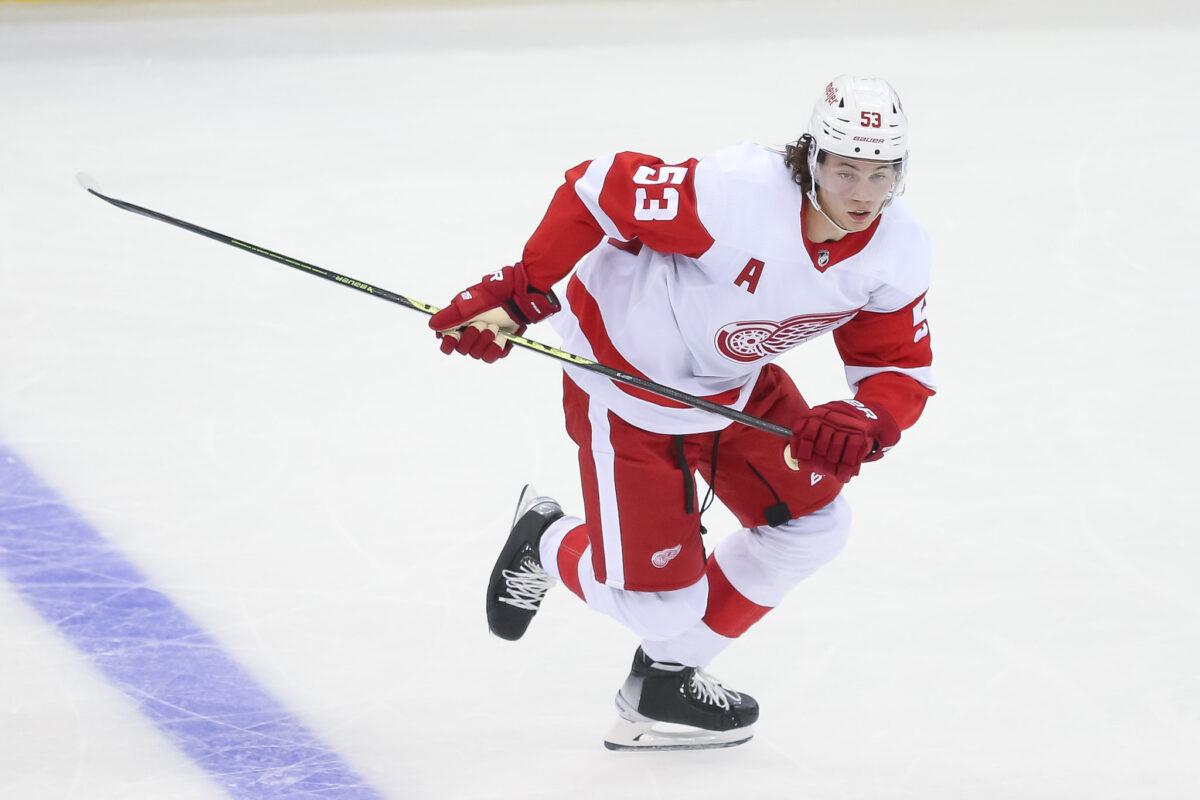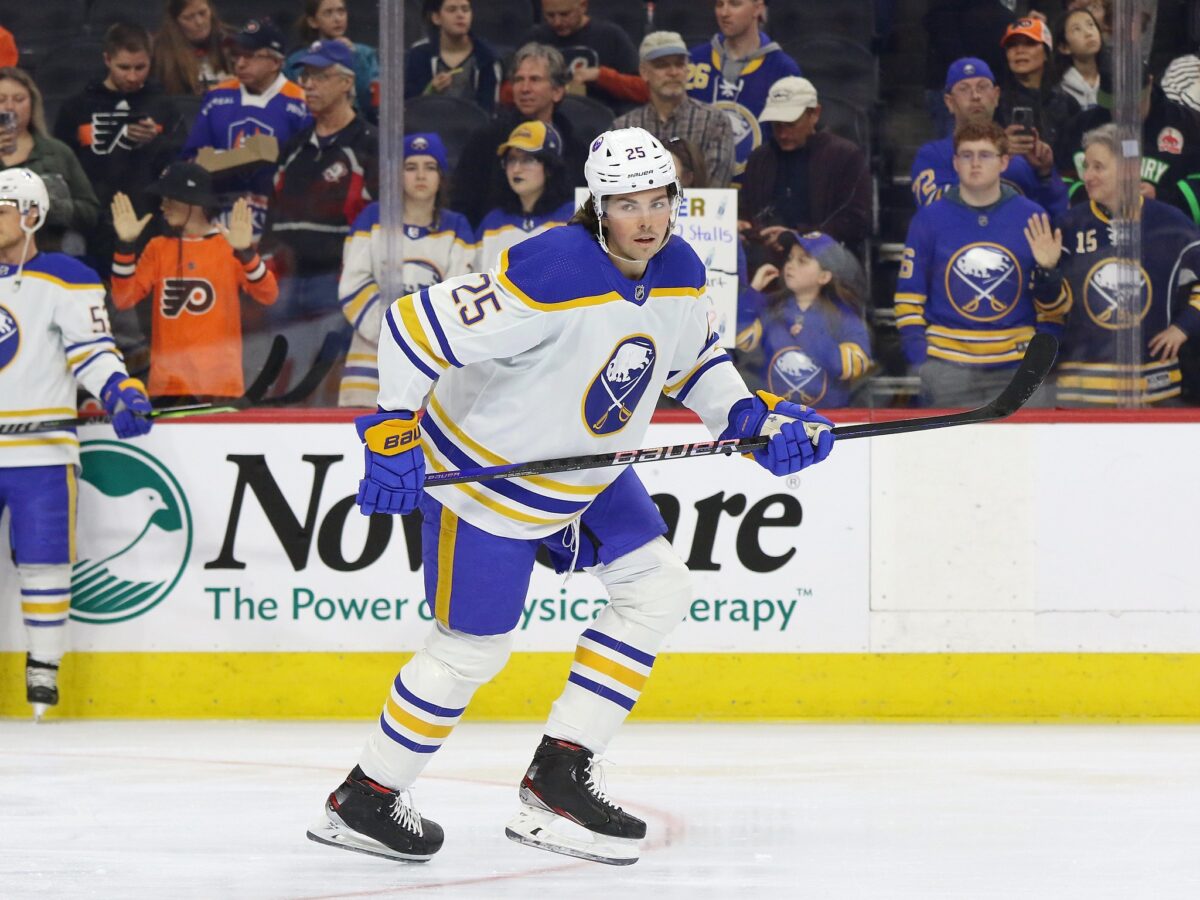Now that the 2023-24 season has officially begun, the clock is ticking on extensions for two of Detroit’s best young players, Lucas Raymond and Moritz Seider. While Raymond has had an up-and-down journey in the NHL so far, Seider has been much more steady, looking the part of a really solid number one defender with enough offense to contribute on the top power play and enough defense to lead the team on the backend.

So what is Seider’s next deal going to look like? Will the Red Wings try to sign him to a short-term bridge deal to make sure they know what kind of player he is or to make sure they know how high the salary cap is going to rise over the next few seasons? Will they sign him long term this year, likely overpaying a bit for the first year or two before seeing tons of surplus value as Seider matures into his prime and the salary cap continues to rise?
Related: NHL 2023-24 Calder Trophy Predictions
I believe that the Red Wings would be best served by going for a long-term extension with Seider right out of his entry-level contract (ELC), locking in a franchise cornerstone for the better part of the next decade. Luckily for us, multiple high-pedigree defenders have recently been signed to long term extensions off their ELCs, such as Jake Sanderson and Owen Power, helping to set the market for a Seider extension and giving us an idea of what to expect on his next deal.
Why a Bridge Deal isn’t the Right Move
A bridge deal is only valuable for a team when they aren’t certain about a player and they’re too nervous to commit tons of cap space to someone they’re not sure will be a game changer moving forward. Seider has already proven to be a high-end NHL player early in his career and I think it’s fair to expect he will continue to develop and grow over the coming years.
Signing bridge deals with star-level players can help a team save some money in the short-term, while costing them extra on the next deal. Just look at Elias Pettersson in Vancouver, who is currently in the third year of a bridge deal paying him $7.35M/year. Had Vancouver paid him $8.5-9M on a long-term deal before he broke out as a superstar, they could have six full seasons remaining at a reduced cap hit. Instead, they went the bridge route and will have to pay him at least $10M a year (though north of $11M is more likely) on a long-term deal starting next season.

Cost certainty is an extremely valuable thing for NHL teams in a flat cap world, just look at the Buffalo Sabres who have signed long-term extension with their top two centers (Tage Thompson and Dylan Cozens) as well as their top two defenders (Rasmus Dahlin and Power) over the last 14 months, locking in their core and allowing them to simply focus on building a strong enough supporting cast for the next seven years.
Detroit’s cap situation also makes a bridge deal a ridiculous choice, since they have a ton of space now and would be much better served by overpaying a little for the first few years of a Seider extension rather than saving in the short-term. Signing a bridge with Seider would probably land him in the $6-7M range, but a long-term deal following that could cost the team more than $10M/year, especially if the cap rises significantly. They’ve got the cap space now to eat a larger cap hit, and I expect it won’t take long for Seider to not only be worth a big contract, but to outplay it.
Why a Long Term Deal is Best for Seider
A long term contract is best for Seider as it guarantees him a high salary for the longest possible period of time, but it is great for the team as well for many reasons. Firstly, they can continue to set an internal cap structure, something they started with Dylan Larkin’s extension last year. Signing your top-line center and captain to a deal worth $8.7M/year basically lets the team say “you want to get paid more than your captain?” in contract talks with every player, and the team could easily set up Seider as another such marker to try and keep cap hits a bit lower across the team.
Another reason that a longer deal is the right fit here is the cost certainty that it would provide the team, knowing that they’ve got their top center and top defender locked in for seven plus years. Not having to worry about that internally is huge, but not being surrounded by the media circus that contract talks summon is huge for players as well.
Power’s Contract is a Great Model for Seider
Power was recently extended by the Sabres on a seven-year deal worth $8.35M each year. I believe this was a great bet for the Sabres on a player who is just getting started in the NHL and who should blossom into an elite two-way defender over the course of the contract. This deal is also a blueprint for Seider should he and the Red Wings talk about a lengthy extension.
Seider certainly has more pro experience than Power, with over 160 NHL games and nearly 300 professional games to his name while Power sits at 88 NHL games at the time of writing, but Power is a recent first overall pick who most see as the more offensively gifted of the two. Power is an incredibly intelligent player who uses his hockey sense incredibly well on both ends of the ice, while Seider is a bit more inclined to drop a shoulder and crush oncoming attackers with a check.

While Seider certainly has more experience than Power, I think it’s hard to argue he’s going to be significantly better than him over the course of the next seven or eight years so I think the blueprint of a seven year deal worth somewhere between the $8-8.5M range is a fair landing spot for Seider.
If that is even an option for the Red Wings, they should take it and run. Seider has looked like a legit number-one defender for the Red Wings since day one, as long as you ignore that run last year with Ben Chiarot that made Seider look human again. He is one of the cornerstones of this franchise and they would do well to lock him up long term as soon as possible.
What Will Seider’s Next Contract Look Like?
I do think that Seider will sign a long term deal sometime in the next 12 months, it makes too much sense not to, especially since the team can be pretty confident in the player they’re getting after a 200+ game sample size. I expect the floor for Seider on a long-term deal is in the area of Jake Sanderson’s recent $8.05M deal with Adam Fox’s $9.5 contract serving as the ceiling.
Related: Nate Danielson is Better Off in the WHL
Ultimately, I think Power’s deal is a really safe landing spot for both the player and team, though the certainty that comes with Seider’s plentiful NHL experience could be enough to increase the contract’s annual value closer to the $9M mark.